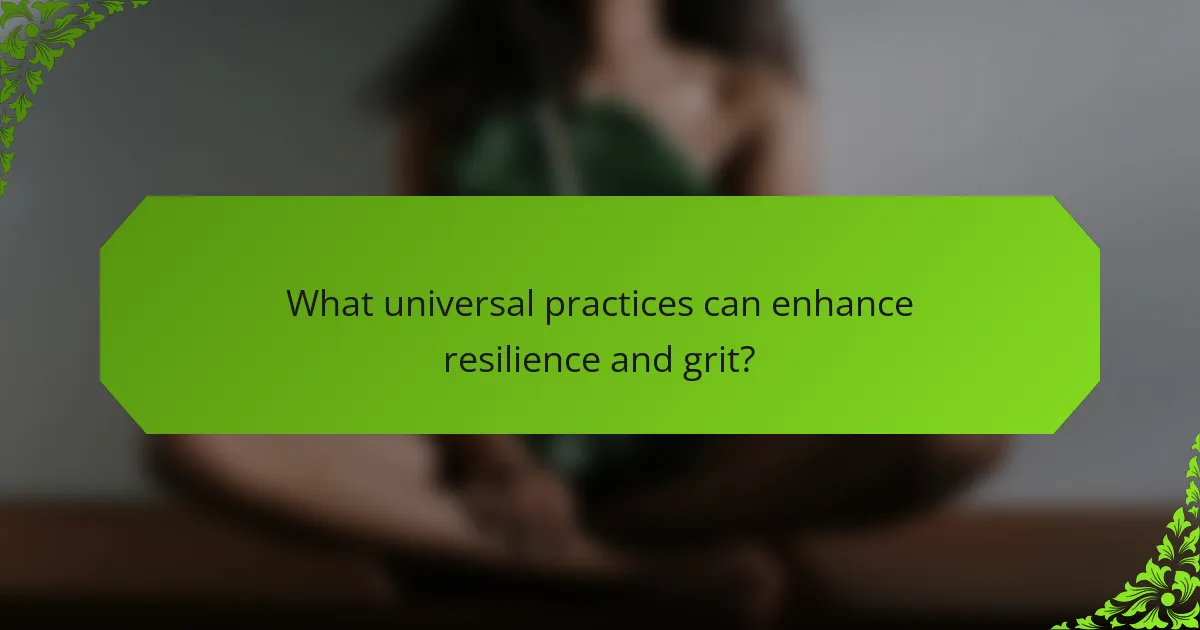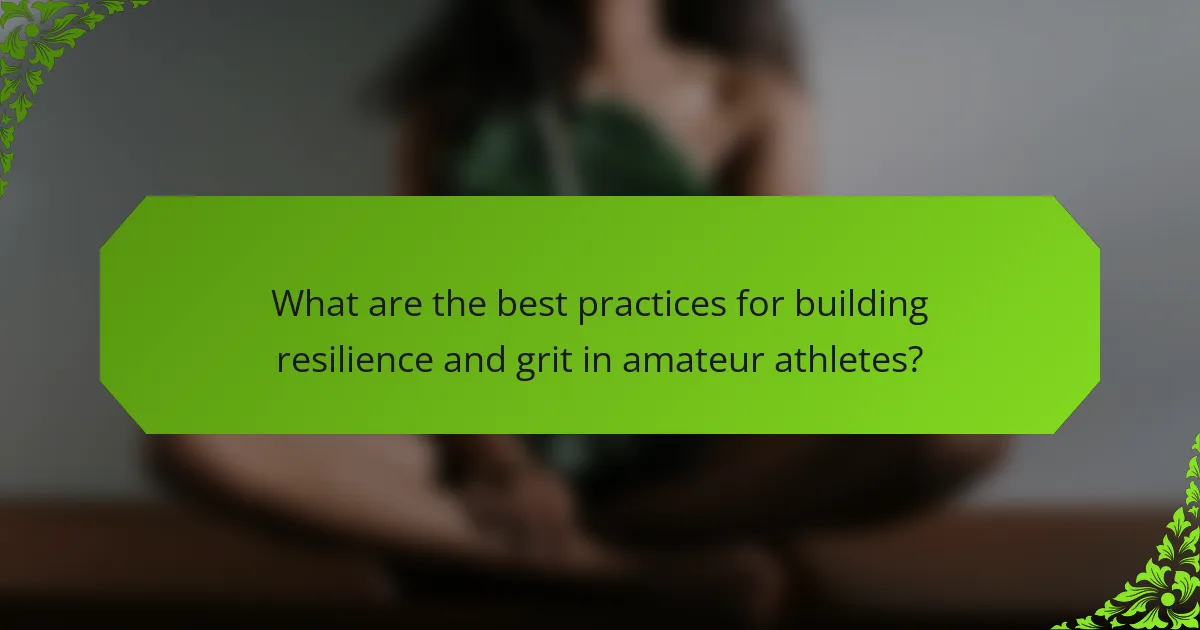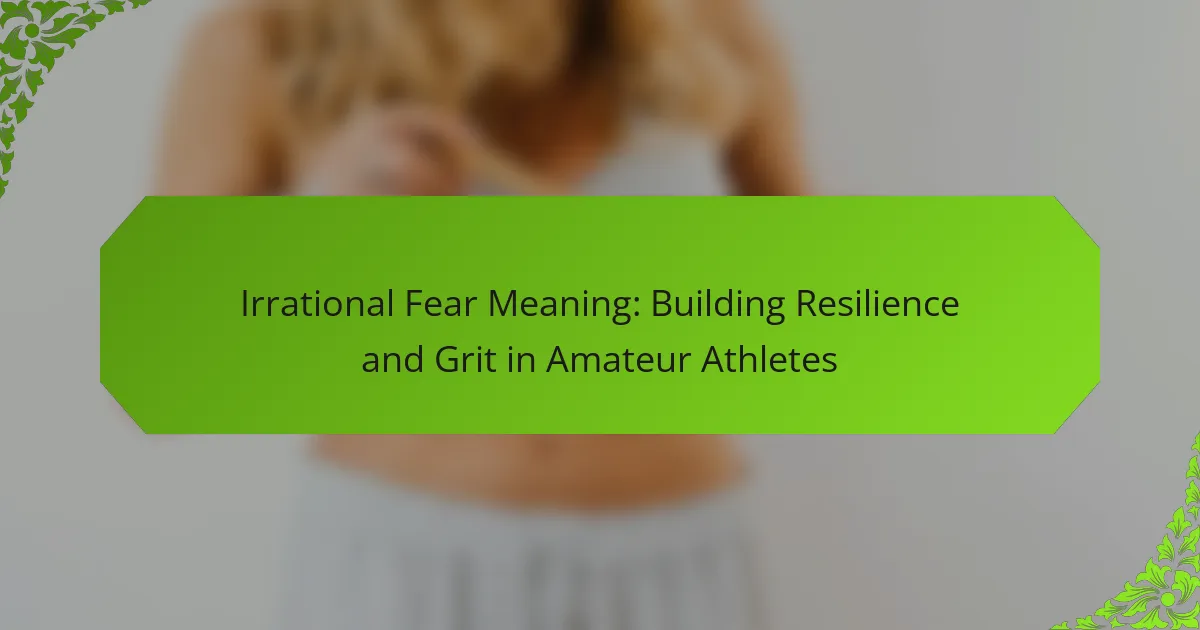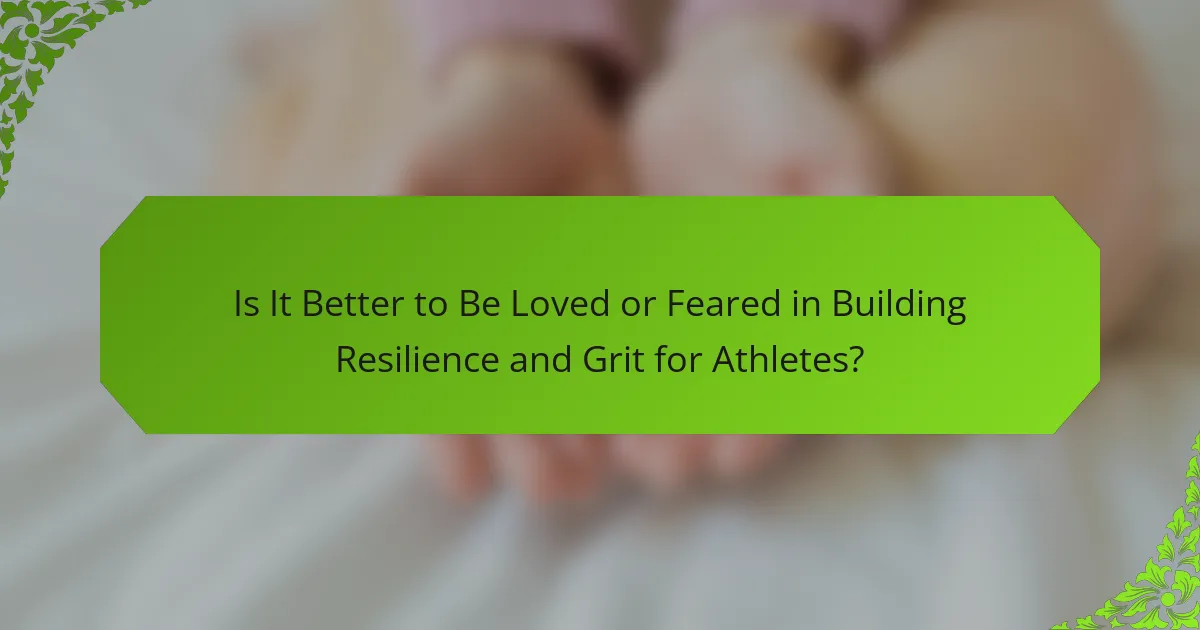Building resilience and grit through sports coaching can significantly enhance the performance of amateur athletes. This article explores how family businesses can create supportive environments, implement personalised coaching, and foster mentorship opportunities. Additionally, it highlights the importance of community engagement and consistent practice in developing mental toughness. By focusing on these strategies, family businesses can help athletes overcome challenges and achieve long-term success.

How can resilience and grit benefit amateur athletes?
Resilience and grit significantly enhance amateur athletes’ performance by fostering perseverance and mental toughness. These traits enable athletes to overcome setbacks, maintain focus, and achieve long-term goals.
Resilience helps athletes recover from injuries and failures, while grit drives consistent effort and commitment to training. Developing these qualities through sports coaching can lead to improved performance and personal growth.
Moreover, resilience and grit contribute to better stress management and emotional regulation, essential for competitive environments. Athletes with these attributes are more likely to succeed, both in sports and in life.
Incorporating resilience and grit into training programmes can create a supportive atmosphere, encouraging athletes to embrace challenges and persist through adversity.
What are the key components of resilience in sports?
Resilience in sports involves mental toughness, adaptability, and a strong support system. Key components include emotional regulation, goal-setting, and perseverance. These attributes help athletes face challenges and recover from setbacks effectively. Building resilience through sports coaching fosters grit and determination in amateur athletes.
How does grit influence athletic performance?
Grit significantly enhances athletic performance by fostering perseverance and resilience. Athletes with high levels of grit maintain focus during challenges, leading to improved training outcomes. Research indicates that grit correlates with success in sports, as it encourages consistent effort and long-term commitment. This attribute allows athletes to push through adversity, ultimately contributing to their overall performance and achievement.

What universal practices can enhance resilience and grit?
Practices that enhance resilience and grit include setting clear goals, fostering a growth mindset, and encouraging teamwork. These strategies help amateur athletes develop mental toughness.
Goal setting provides direction and motivation, while a growth mindset promotes learning from setbacks. Teamwork builds support networks, essential for overcoming challenges. Engaging in regular reflection on experiences further strengthens resilience.
What role does consistent training play in building resilience?
Consistent training is crucial for building resilience in amateur athletes. It fosters mental toughness, enhances adaptability, and develops a strong work ethic. Regular practice creates a routine that helps athletes cope with challenges, setbacks, and pressure. As a result, they learn to persevere through adversity, which is a unique attribute of resilience. Furthermore, consistent training builds confidence, enabling athletes to face competition with a positive mindset. This cumulative effect of training contributes significantly to their overall grit and determination in sports.
How can goal-setting improve grit in amateur athletes?
Goal-setting significantly enhances grit in amateur athletes by providing clear objectives and a sense of direction. This process fosters resilience, motivating athletes to persist through challenges. Research indicates that athletes who set specific, measurable goals exhibit higher levels of commitment and perseverance. By tracking progress, they develop a growth mindset, which is essential for overcoming obstacles. Additionally, goal-setting helps athletes focus on their training, leading to improved performance and increased self-efficacy. This structured approach cultivates a strong sense of purpose, further reinforcing their grit in sports.
What are SMART goals and how do they apply?
SMART goals are specific, measurable, achievable, relevant, and time-bound objectives that help amateur athletes in family businesses focus their coaching efforts effectively. Applying SMART goals in sports coaching enhances resilience and grit by providing clear benchmarks for progress. For instance, setting a goal to increase a player’s free throw percentage by 10% over three months creates a structured path for improvement. This focus on measurable outcomes fosters a growth mindset and encourages consistent effort, essential attributes for success in competitive sports.
Why is mental conditioning essential for resilience?
Mental conditioning is essential for resilience because it fortifies mental strength and adaptability. It enables amateur athletes to face challenges confidently and recover from setbacks effectively. By developing a resilient mindset, athletes can enhance their performance under pressure, leading to greater success in sports and life. Furthermore, mental conditioning fosters grit, encouraging persistence in the face of adversity, which is crucial for achieving long-term goals.

What unique strategies can family businesses implement for athlete development?
Family businesses can implement unique strategies for athlete development by fostering a supportive environment that emphasizes resilience and grit. One effective approach is personalised coaching, where family members leverage their understanding of the athlete’s strengths and weaknesses to tailor training programmes. Additionally, incorporating family values into the coaching process can instill a sense of commitment and accountability in athletes.
Another strategy is creating mentorship opportunities within the family business. Experienced family members can share insights and life lessons that extend beyond sports, helping athletes develop mental toughness. Furthermore, establishing a culture of teamwork within the family can enhance the athlete’s ability to collaborate and communicate effectively with peers.
Lastly, family businesses can organise community engagement activities that promote sportsmanship and resilience. These initiatives not only build character but also strengthen the athlete’s connection to their community, reinforcing the values instilled through family traditions.
How can family-run sports coaching programmes foster grit?
Family-run sports coaching programmes can effectively foster grit by creating a supportive environment that emphasizes perseverance. These programmes often leverage family values to instill resilience in young athletes. Coaches, typically family members, provide personalised guidance, fostering deeper emotional connections. This unique attribute enhances motivation and commitment, essential for developing grit. Additionally, the close-knit atmosphere encourages athletes to embrace challenges and learn from failures, reinforcing their ability to persist in the face of adversity. As a result, family-run programmes cultivate a strong foundation of resilience that extends beyond sports.
What unique mentorship opportunities can enhance resilience?
Unique mentorship opportunities that enhance resilience for amateur athletes include personalised coaching, peer mentorship programmes, and workshops focused on mental toughness. Personalised coaching provides tailored strategies to overcome challenges, while peer mentorship fosters a supportive environment. Workshops that emphasize mental resilience teach athletes how to handle setbacks effectively. These approaches cultivate grit and adaptability, essential traits for success in sports and beyond.

What rare attributes contribute to long-term success in amateur sports?
Resilience, adaptability, and community support are rare attributes that contribute to long-term success in amateur sports. Resilience enables athletes to overcome setbacks and maintain focus. Adaptability allows them to adjust strategies in response to challenges. Community support fosters a nurturing environment, enhancing motivation and commitment. These attributes collectively build a strong foundation for sustained athletic performance.
How does community support impact resilience in athletes?
Community support significantly enhances resilience in athletes by providing emotional, social, and practical resources. This support fosters a sense of belonging, which can improve mental toughness and perseverance. Studies indicate that athletes with strong community ties are more likely to overcome challenges and setbacks, thus building grit. Family involvement, peer encouragement, and coaching relationships serve as unique attributes that contribute to this resilience. As a result, athletes experience improved performance and well-being, highlighting the essential role of community in sports coaching.
What are the benefits of interdisciplinary approaches in coaching?
Interdisciplinary approaches in coaching enhance resilience and grit in amateur athletes by integrating diverse perspectives. They foster holistic development, combining physical training with psychological support and strategic thinking. This synergy improves adaptability, promotes teamwork, and encourages innovative problem-solving. As a result, athletes develop a stronger mental framework, essential for overcoming challenges in sports and life.

What are the best practices for building resilience and grit in amateur athletes?
To build resilience and grit in amateur athletes, focus on consistent practice, positive reinforcement, and goal setting. Cultivating a supportive environment enhances motivation and persistence. Encourage athletes to embrace challenges and learn from failures, as these experiences foster growth. Incorporating mental training techniques, such as visualization and mindfulness, can significantly improve mental toughness.
What common mistakes should be avoided in coaching for resilience?
Coaches should avoid common mistakes that hinder resilience development in amateur athletes. Focusing solely on winning can create pressure, leading to burnout. Neglecting individual athlete needs undermines personal growth. Overemphasizing criticism can diminish confidence. Lastly, failing to teach coping strategies limits resilience building.
How can athletes self-assess their grit levels?
Athletes can self-assess their grit levels by reflecting on their perseverance and passion for long-term goals. They should evaluate their responses to challenges and setbacks, considering how consistently they pursue their objectives. Self-assessment can include journaling about experiences, rating their commitment on a scale, and seeking feedback from coaches. Additionally, athletes can utilise tools like grit questionnaires to quantify their levels of resilience. Regular reflection fosters greater awareness of personal growth and areas for improvement.
What immediate actions can families take to support their athlete’s development?
Families can take immediate actions to support their athlete’s development by fostering a positive environment and encouraging consistent practice. Establishing a routine for training and nutrition enhances discipline. Engaging in open communication about goals builds trust and motivation. Providing emotional support during challenges reinforces resilience. Actively participating in their training process can strengthen family bonds and enhance the athlete’s commitment.



